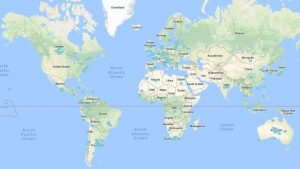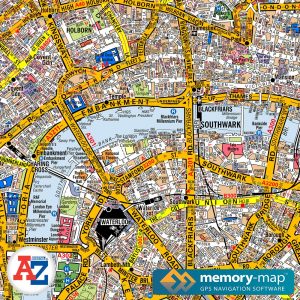I recently had someone ask me to post answers and vocabulary for the topic of MAPS in IELTS Speaking Part 1. It’s not a common topic to get but it is being used at the moment.
On this page, you will find:
- Questions for the topic of MAPS
- Model Answers for the topic of MAPS
- Information about the examiner interrupting your answers
- Useful link to more model answers.
Map Questions for IELTS Speaking Part 1
Below is a collection of questions about MAPS. The examiner will usually select between 3 or 4 questions to ask you for one topic. Part 1 usually contains about 3 topics.
- What kind of maps are available?
- Do you often use maps?
- Have you ever used a map to find a location?
- Do you prefer paper maps or electronic maps?
- Which is better, paper maps or e-maps?
- Why do some people prefer electronic maps?
- Did you ever use a map when you were a child?
- Did your school ever teach you how to use maps when you were younger?
- Do you ever ask anyone for directions?
- Would you ever use a map on holiday?
World Map
Street Map of Central London
Model Answers for MAPS Speaking Part 1
These model answers are actually quite long for speaking part 1, but I wanted to give you a chance to learn useful words and phrases. It is fine to prepare lots of ideas for part 1. The examiner will interrupt your answer when it’s time for the next question so always keep talking until that happens. See below about the examiner interrupting your answer.
What kind of maps are available?
There are quite a few, for example world maps that show all the countries in the world and their location. There are also maps for individual countries, road maps for main motorways in a country and street maps for the streets in a given city centre. Some maps show climates around the world or other particular information. It is possible to choose between paper maps or digital maps, such as Google Earth.
Note: The examiner is not testing your knowledge. Even if you don’t know many kinds of maps it doesn’t matter because you can showcase your English in other answers.
Do you often use maps?
I use them only when I’m going to a new place. Before any holiday, I use an online map beforehand just to see the exact location of the place I’m going to. I also check the street map to see how central my hotel is before I book it. If I’m driving anywhere new, I’ll check the map to find the quickest route and then have the map app on my phone visible throughout the drive so I don’t lose my way.
Why do some people prefer using e-maps?
Well, I guess it’s because they can be easily accessed by phone which means people will be carrying them anyway. Also you can zoom in to enlarged the map to see more detail with just a simple click, rather than rooting around to find a new paper map for the detail. Online maps also allow the user to access extra information about restaurants and hotels which is really useful.
Did schools ever teach you to use maps?
I can’t say that I learned a lot about maps, but we did spend some time looking at a world map and a map of our own country. We spent time labelling the major cities of our country on a blank map and filling in details such as population and shared borders with other countries. But we didn’t really learn how to read maps, such as road maps or street maps which is a shame.
The Examiner Interrupts my Answers
It is 100% normal that the examiner will interrupt your answer in speaking part 1. They are not being rude, it is just part of the testing system. Once they know that you can easily handle the question, they will interrupt you to move on and test you on another question. This way they are hearing a broader range of your English which is the only way to award a higher score.
This all means that you must keep talking until the examiner interrupts your answer. When that happens, don’t be surprised and just listen to the next question.
Useful Link
Below is a link to the main speaking page which contains tips, model answer, topics etc:
If you want to learn about the other parts of the test, click on the RED BAR at the top of the website.
All the best
Liz







Hi Liz,
Thank you so much. I did Ielts today (12/12 – Hanoi/Vietnam) and I got this topic.
I hope it went well 🙂
Dear Liz,
Thank you for giving this useful information about maps
Thanks Liz. Very incidentally I known your website. It’s very useful for me this period, i’m studying IELTS with target of 7. Your testing samples and videos are so useful and easy to understand.
Thank you again and all the best to you!
Diep
Glad you found my site 🙂
Thanks Liz. I found your teachings very helpful
Thanks Liz for the lectures. Your kindness is deeply appreciated.
Thanks liz …i really appreciate it
Wanted to learn more from you.
Hello Liz.
I am a great fan of your blog!
I sit for IELTS on 2016 with good score (band 8) but did not score high on writing (band score 6.5). The reasons were: I did not complete the tasks as I did not mind the time properly.
I wrote a decent essay for task 2, but on the diagram, I did not finish.
This last was a drawing (a map if you will) of a city in 1950 and 2000 and the task was to report on the diferences or progress made during that time based upon the changes in the drawing.
I find it very challenging since I had practice on charts, graphics and schemes of processes but did not come across with this type of “map comparison task”.
Would you provide us with an example of such a task?
Many thanks.
Andrea
Did you check all the model answers and tips on this page: https://ieltsliz.com/ielts-writing-task-1-lessons-and-tips/ ??
I did IELTS on 10 November 2018, and my speaking test was about maps. Similar questions.
Unfortunately I have to do again, because I need overall 6.0 and I got 5.5
Good luck!
Thank you.
Hello madam,
This enquiry is regarding task 2.
I had purchased your essay lessons, I have some doubt.
1*shuold I included my opeinian if questions say what extent do the advantage outweigh disadvantage (there is no word of” you”)
2*same for positive or negative
Hope you will consider my request and kindly give advice
They all require you to choose and express your own view.